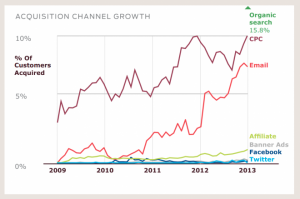July 25, 2013 at 6:33 am, by Carl
My friends know that I love email….and that I am usually one of the loud voices that email is dead. Well, I know its not dead…heck, its not even really 20 years old yet, and millions of emails are sent every day. However, as Pew Research and others have showed recently, email is very dead among the under 30 crowd (even more so with the under 20 crowd). And, it is my experience that email causes severe problems, especially among personal relationships; usually this happens because both poor expectations about email communication and poor habits about how to do it.
However, our good friends at Wired recently wrote about how email remains a vital aspect of communication, especially among marketing. Check this out–first, the good folks at Wired taught a clear lesson from President Obama’s last campaign. The lesson was that you should not fear sending out too many annoying emails, or even being concerned that your emails are annoying at all. Instead, the team for running the campaign electronically learned that they should send MORE emails out.
The fundraising emails — more than four hundred in all — appeared hour after hour, day after day because they worked. An elaborate “More Emails Test” showed conclusively that the more fundraising emails that went out, the more money came back … simple as that.
Even the $3 ask — just enough to cover the credit card processing — helped build lists and increase a sense of ownership on the part of supporters. The growth in the number of people unsubscribing because they couldn’t stand the alarmist emails was much slower than the growth of cash flowing in, and Chicago knew that peeved unsubscribers would end up voting for Obama even if they thought the emails sounded like sketchy pleas from Internet con artists.
Goff concluded that ignoring the human desire not to be annoying may have been the single greatest conceptual breakthrough of the campaign. It turned out to be worth more than $100 million.
Did you catch that? Even though they lost some people through repeated emails, those losses were more than made up for by others either joining the lists or better, actually doing what the email asked. As one who has tried to send less emails in the hope of not being annoying, this was quite a shock. Looks like my peers at Valencia should be ready for more emails from me, asking for help, soliciting for ideas or just generally trying to explain things. Yes, some will be annoyed, but this data suggests those few will be offset.
And why not? In another posting, Wired noted that the data was clear that email continues to trounce both Twitter and Facebook for making sales. Check out this image from the marketing data company, Custora:
Of course, they found (As the graph shows) that people who came buying after a direct search (via Google, Yahoo, Bing, etc…) were most clearly buying. That’s kind of obvious, isn’t it? But, with all the hype about social media, I would have expected at least facebook to be higher, maybe even closer to email. Nope.
Here’s what the experts noted:
Email, on the other hand, has a certain unfair advantage in that shoppers getting the emails have already given up their addresses to a site, suggesting they already have some prior relationship with that retailer. Still, despite the avalanche of spam we all get, it’s easy to see how the staying power and greater potential for personalization of a medium without a 140-character limit gives email distinct advantages.
Custora’s findings don’t bode especially well for social media business models, especially Twitter. Of course, ads on Facebook and Twitter don’t have to lead to immediate clicks to have an impact. They still have the potential to raise ambient awareness.
The takeaway for anyone reading who is looking for a way to increase sales, increase their reach for their business is simple. Keep sending email, and tapping into President Obama’s team’s strategy, SEND MORE EMAILS.
For the rest of us, it will help to continue to see email as a part of our communication strategy. Not sure for how long, nor does this news deal with the increased stress or pressure in relationships due to communication failures stemming from email. Yet, I wouldn’t cancel your email just yet.
Leave a Reply
Inappropriate or irrelevant comments will be removed at an admin's discretion.














3 Comments to Email is Dead?
Aaron SmithJuly 26, 2013 at 12:29 am
Great insight Carl. Very interesting indeed.
CarlJuly 26, 2013 at 3:28 pm
Thanks Aaron! The whole conundrum about modern communication is such a frustrating issue. Hopefully something starts to make more sense in the days ahead. 🙂 Thanks for reading!!
Trackbacks